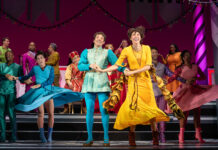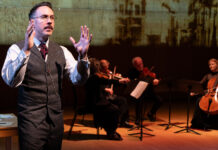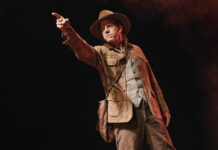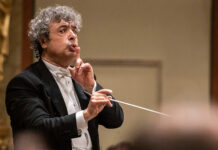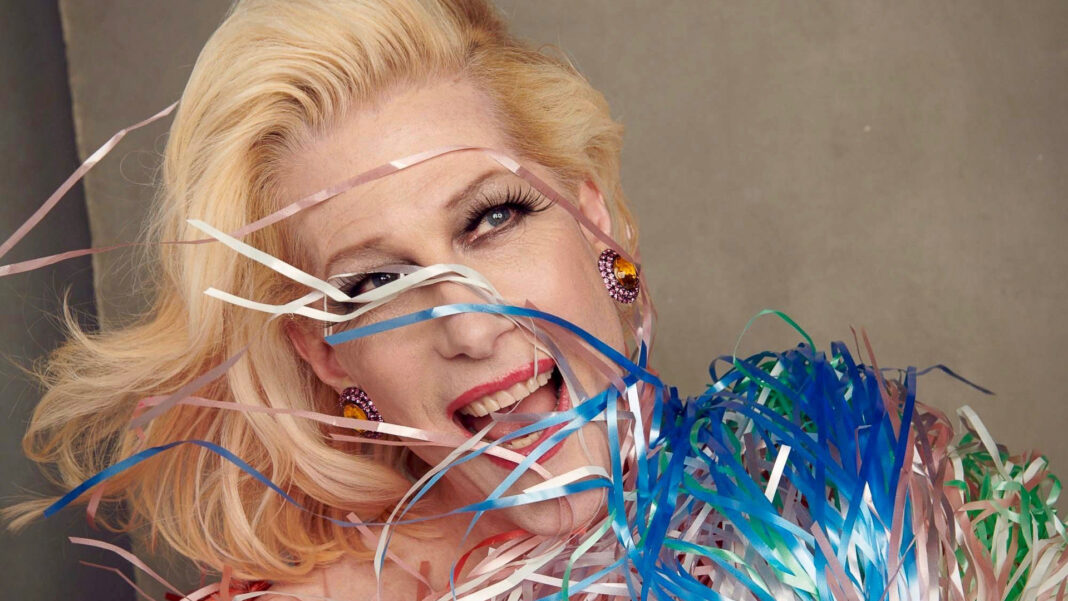Earlier this week Mx. Justin Vivian Bond was named one of the 2024 MacArthur Fellows. Often referred to as the Genius Grant. Bond receives $800,000 over five years. Cultural Attaché congratulations Bond on this well-deserved award. Let’s revisit my interview with Bond from May of this year.
“I sort of made my name playing an alcoholic, broken down chanteuse. So it seemed inevitable that I would get an award for that someday.” That was the beginning of my conversation with Mx. Justin Vivian Bond when talking recently about Bond being named the first recipient of the Judy Icon Award at this year’s Night of A Thousand Judys at Joe’s Pub in New York on June 3rd.
This is the 12th year of the event that celebrates the legendary Garland while also raising money for the Ali Forney Center, an organization that provides housing and services to homeless LGBTQ+ in New York City.
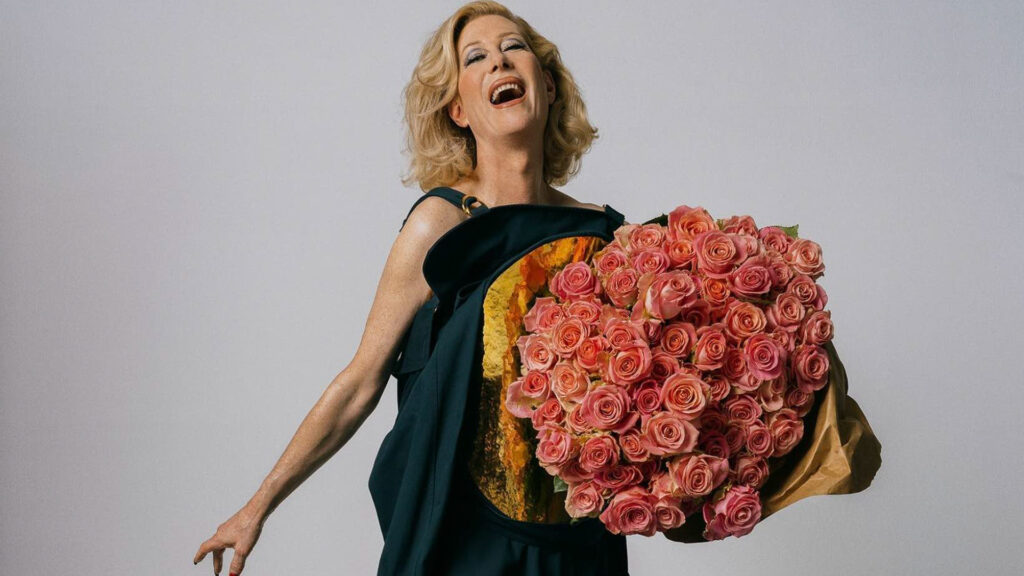
Bond, who uses v as the preferred pronoun, is a transgender singer, actor, cabaret artist whose shows (including Rare Bird which premiered at Joe’s Pub in New York in early May and will be performed May 30th – June 1st at Feinsteins At the Nikko in San Francisco; Bond will debut Night Shade at Joe’s Pub June 20th – June 30th) range from the brilliant to the absurd in equal measure. V is also one half of Kiki & Herb with Kenny Mellman.
In 2021, Bond collaborated with countertenor Anthony Roth Costanzo on a show called Only an Octave Apart. The critically-acclaimed show was recorded and the album was released in January of 2022
Last week I spoke with Bond about Garland’s influence, whether having a legacy is important to v and the role of dreams in one’s life. What follows are excerpts from our conversation that have been edited for length and clarity. To see the full interview with Bond, please go to our YouTube channel.
You are the first recipient of the Judy Icon Award at Night of a Thousand Judys. How did that feel when you found out?
I’m very honored. Justin Sayre is somebody who I’ve respected for a long time. The work that he has done in the queer community, his performances and what he has to say with his work has always been very important and inspiring. So, to be honored by him and the group of people that he works with on the show is very flattering, obviously. You know, to get a Judy award, that’s pretty fancy.
I read an interview that Anthony Roth Costanzo gave to the New York Times in September 2021 when you were doing Only an Octave Apart. He talked about the process of working with you and said, “I’m always looking for structure. And Viv is always like, ‘Don’t box me in because it’s not going to be as good.'” That sounded like something Judy Garland would say. How much of an influence has Judy Garland been on you both as a as a professional and as a person?
When I was a kid, as everybody who grew up the generation I did, every year The Wizard of Oz played on TV. And every year I was terrified by the flying monkeys and the Wicked Witch and I identified with Dorothy Gale. Growing up in a small town as a queer person, you know that somewhere over the rainbow, bluebirds fly, why can’t I? That was the question I asked myself when I was very young.
Of course, when you’re young and you see these sort of tragic stories play out, they’re very dramatic. But now that I’m 61 and knowing that I’m a decade-and-a-half older than she was when she passed away, it gives you a different perspective. But she has given me, I don’t know, fodder and intellectual inspiration, I guess, for my entire life.
Has the role she’s played as an influence in your own life evolved as you’ve gotten older and as you’ve come to understand that she was much more than just the character of Dorothy in The Wizard of Oz?
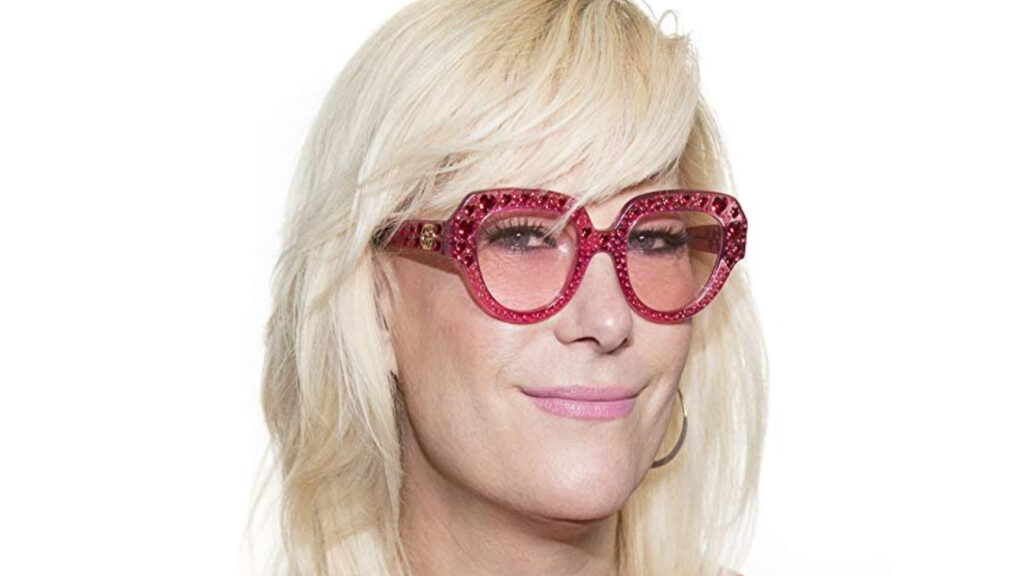
Yes. There’s no way that I think you could really understand fully what she experienced if you haven’t been in show business. I also feel like being a minority in show business, a marginalized sort of person, what people try to get away with because they feel like you are more powerless than they are, can be galling. But fortunately I have somehow managed to avoid that for the most part. I do that not by being in the mainstream, but by basically forging my own path. So I think maybe I learned that from her as a cautionary tale, as well as just the brilliance of her talent and hard work.
In a 1967 interview that Judy Garland gave Barbara Walters on the Today Show she said, “I’ve gotten to the age where I rebelled, and I’m going to hit and hit back.” With all the political rhetoric that we’re facing right now, from all walks of life, about trans, non-binary people, what’s the best way to to rebel against that vitriol that accompanies these comments and actually inspires even greater vitriol?
My strategy, for the most part, has always been to put my body where it needs to be; whether it be on the street, whether it be at a protest, whether it be at a meeting or whether it be on the stage or sometimes on the screen. I feel like the most powerful thing that I can do as a trans person is live as full and rich and joyful a life as I can possibly live, in spite of all of that. I take a lot of comfort in knowing that the people who are coming after us are invariably much less happy and much less comfortable with who they are than we are.
There’s that old axiom that success is the best revenge. But I think happiness is the best revenge.
I agree completely, and happiness is a skill that you develop and also something that you can’t be all the time. So if you aren’t happy at certain moments, you have to address them. I have a therapist who said, “Well, you are depressed, but you have a good reason for being depressed.” So work on getting through that, addressing it and dealing with it, and then hopefully it will pass. Sometimes it takes the medication, sometimes it takes therapy and sometimes it just takes time.
Kenny Mellman last year compared your level of fandom to Garland’s. “It’s as if Viv were a Judy Garland, but alive.” Of course, that sounds like a variation of your Whitney Houston joke. Your fans will know what I’m talking about, but what parallels do you see between your fan base and the fan base that Judy Garland has?
They have, what was the line? Judy said they have good taste. I love my fan base and I’m proud of having a very intelligent, witty, and loyal fan base. I try to keep myself as fresh and invigorated for them as possible. It makes it easy because they’re so receptive to what I do and they’re willing to go with me where ever I may take them.
This year is the 55th anniversary of Judy Garland’s death. If 50 or 55 years after you’ve shuffled off this mortal coil somebody wants to prepare a Night of a Thousand Vivs, what would you like it to be?
I couldn’t care less when I’m dead. I really don’t care. I don’t care if anybody ever remembers me after I’m dead or not. I don’t care about that, honestly. I just want to enjoy my life. That’s up to other people, too. I don’t have that kind of ego where I feel like, oh, I want to live on forever. I really don’t. I think that’s part of why I don’t make so many records, because I don’t really care. I’m not there when people listen to them. So I don’t get any pleasure out of them. You don’t make any money.
I like singing live, and I guess that would be something also that I have in common with Judy Garland, because her live performances are so much more legendary, and the recordings of her live performances, than her studio records. There’s that chemistry that happens, the empathy and the relationship that you develop with the live audience, that you can’t really create. I think that’s also why working on Only an Octave Apart with Anthony in the studio might have been more powerful than doing solo records in the studio, because we were there together. We were performing for each other, and that, I think, ups the ante.
Even though there’s just a few weeks difference between when you debuted Rare Bird at Joe’s Pub and will now be doing it in San Francisco, does your relationship with the material change? Do you alter the show?
The material will not be the same because when I did the show here in New York, I did it with my full band. I’m coming to San Francisco with David Sytkowski, my pianist. He’s been with me at Feinstein several times now, but the only reason I ever wish I was more famous or more successful is so I could tour with my band because it’s so expensive. It’s impossible. But that doesn’t make the show any less interesting. I spent an entire career and it was just Kenny Mellman and I – pianist and singer on stage. I don’t feel like the audience is losing out on anything. But because of that, I have to work a little harder and come up with a different set list that has a lot of the same material, but some of the things just sounded better because you had background vocalists or just little things that technically wouldn’t work as well.
You’re going to Joe’s Pub for nine performances in late June which will be a completely different show.
Yes, that show is called Night Shade. It’s about how queer people exist at night and songs about nighttime and songs that you would listen to at night. I haven’t completely narrowed down the setlist yet, but I’ve been having a lot of fun picking it out.
When you said Night Shade, I thought, oh, it could be just the crap, the shade, we throw at each other.
It could just be what we do with eggplant emojis.
You appeared in Desert In, which is a video series that Ellen Reid and James Darrah and christopher oscar peña did. I love how unconventional that series was. What stood out to you most about being part of of that? How much do you think projects like that and Only an Octave Apart, are going to inspire people to explore other ways of presenting music that may not be conventional, or may not even be music that they’re used to listening to?
That was an amazing experience and I felt so lucky to be able to do that during the pandemic. And I have to say, Ellen James and Brad Vernatter who’s the [General] Director at Boston Lyric Opera, found a way to pivot and keep all of these artists engaged and working throughout that pandemic. It was so great because each scene was written by a different composer. It was a huge amount of people and it was so much fun. James is a terrific director. It was a wonderful way of working that I would encourage more people to try because it really appealed to a lot of people.
I think the same thing with Anthony and I. You know cabaret is not one of the top genres in popular entertainment. But I’ve always tried to stay relevant because I just tell the truth. And the only truth I can really tell is my own truth. So working with Anthony and somehow contextualizing all of this opera music that he sings, which is so beautiful…But, you know, I went to his show Orfeo ed Euridice [at the Metropolitan Opera], which premiered last week. I turned to my friend after the show and I said, “The only problem with these operas and they’re all very old – the music’s beautiful, but the characters are all idiots.” You can’t believe how stupid these characters are. So I really love contemporary opera because contemporary opera, a lot of it appeals to a much broader audience because it’s hard to sort of take these things seriously if you’re there for a story because the stories are kind of simple.
During the pandemic James created videos for Los Angeles Chamber Orchestra that took classical music off of the concert stage and put it into our day-to-day lives and I feel like Desert In is part of that as well. That’s the way people are going to get seduced by the art form.
It was an interesting story that was kind of provocative. It had queer tales, it had heterosexual [tales], it had diversity and the writing was fantastic. Yeah, that’s what we need.
In André Breton’s Manifestos of Surrealism he wrote, “I have always been amazed at the way an ordinary observer lends so much more credence, and attaches so much more importance, to waking events than to those occurring in dreams.” You have spoken throughout your career about the role dreams play in your life and their significance. Is Breton right? How much does that perspective inspire you?
When I lived in San Francisco, I went to the Jung Institute and I did therapy there when I was in my 20s. When I moved to New York, I found an analyst who worked at the Jung Institute here. So dreams are very informative. Whether they’re waking dreams or just keys into what’s going on or your own anxieties, or how you relate to other people and how they appear when they’re in your dreams. So I think dreams are important. Also being in my 60s now and having had a lot of my dreams come true and finding out, you know, sometimes that’s a good thing and sometimes it’s not as exciting as you thought it would be. I think it’s important to never stop coming up with new ones.
It’s always important to realize, even when you have reached your dreams, that there are still more dreams.
Yes, absolutely. Because then if there aren’t, what’s the reason to be alive? My mother passed away last year and I told her the last day of her life how I was so fortunate to have her as a role model because she did not stop growing as a person. Becoming more open to new things and learning things and changing until the very last day of her life. And I hope that I can be that way as well.
Could you have dreamed that you would have this career, that you would be at this place in your life?
Oh, yeah. And now I have to come up with new dreams. When I was in high school, I used to love The Merv Griffin Show because he had amazing people that were in New York that I had never heard of before. One of them was Alberta Hunter. She was this jazz singer who was successful in the 20s and 30s and into the 40s. But at a certain point, she stepped away from show business and became a nurse and she lied about her age. So when she was 70 or 72, they thought she was 65 and they forced her to retire from nursing. Then she was rediscovered and she put out a few albums and she had a residency at this club here called The Cookery every Monday night for years. And I thought, that’s how I want to end up.
I want to be an old lady who has a residency and a cabaret in New York and I can go sing my songs every week and never stop working. And that’s what I’m planning on. But I want more things to happen between now and then.
UPDATE: This story previously stated the the Joe’s Pub shows were sold out. They are not. Cultural Attaché regrets that error. There was a a link built into that paragraph where you can click co to purchase tickets and get more information.
To see the full interview with Justin Vivian Bond, please go here.
Main Photo: Justin Vivian Bond (Photo by Ruben Afanador/Courtesy Justin Vivian Bond)


